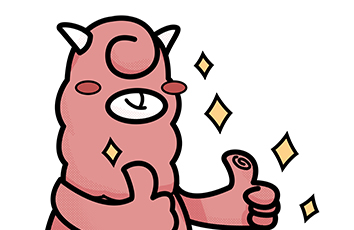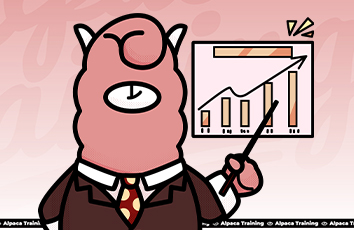各位正在备考PTE的同学们看过来!今天羊驼给大家带来的是PTE写作中的SWT题型讲解:Less sleep time。文章将从生难词的积累、原文的通读解析,找出重要句子和关键词、组成5-75字的一句话答案。大家在平时的练习中,也可以将这样的解题步骤运用进去,相信对大家做题的速度和分数都会有所帮助和提高。
原文:
If it seems like you're not getting enough sleep, you're not alone. People have evolved to sleep much less than chimps, baboons or any other primates studied so far, a new study finds. Charles Nunn and David Samson are evolutionary anthropologists. They study how humans have evolved to behave the way we do. Nunn works at Duke University in Durham, N.C. Samson works at the University of Toronto Mississauga in Canada. In their new study, the two compared sleep patterns in 30 different species of primates, including humans. Most species slept between nine and 15 hours daily. Humans averaged just seven hours of shut-eye. Based on lifestyle and biological factors, however, people should get 9.55 hours, Nunn and Samson calculate. Most other primates in the study typically sleep as much as the scientists predicted they should. Nunn and Samson shared their findings online February 14 in the American Journal of Physical Anthropology.
The researchers argue that two long-standing features of human life may play into our short sleep times. The first stems from when humans’ ancestors descended from the trees to sleep on the ground. At that point, people probably had to spend more time awake to guard against predators. The second may reflect the intense pressure humans face to learn and teach new skills and to make social connections. That has left less time for sleep.
As sleep declined, rapid-eye movement -or REM- sleep took on an outsize role in humans, Nunn and Samson propose. REM sleep is when we dream. And it has been linked to learning and memory.
"It's pretty surprising that non-REM sleep time is so low in humans" Nunn says. "But something had to give as we slept less."
翻译:
If it seems like you're not getting enough sleep, you're not alone.
如果你睡眠不足,你不是一个人。
People have evolved to sleep much less than chimps, baboons or any other primates studied so far, a new study finds.
一项新的研究发现,人类在进化过程中比黑猩猩、狒狒或其他灵长类动物的睡眠时间要少得多。
Charles Nunn and David Samson are evolutionary anthropologists.
查尔斯?纳恩和大卫?萨姆森是进化人类学家。
They study how humans have evolved to behave the way we do.
他们研究人类是如何进化成我们的行为方式的。
Nunn works at Duke University in Durham, N.C. Samson works at the University of Toronto Mississauga in Canada.
纳恩在北卡罗来纳州达勒姆的杜克大学工作,萨姆森在加拿大多伦多大学米西索加分校工作。
In their new study, the two compared sleep patterns in 30 different species of primates, including humans.
在他们的新研究中,两人比较了包括人类在内的30种灵长类动物的睡眠模式。
Most species slept between nine and 15 hours daily.
大多数物种每天睡9到15个小时。
Humans averaged just seven hours of shut-eye.
人类的平均睡眠时间只有7小时。
Based on lifestyle and biological factors, however, people should get 9.55 hours, Nunn and Samson calculate.
然而,根据纳恩和萨姆森的计算,基于生活方式和生物因素,人们应该每天睡9.55小时。
Most other primates in the study typically sleep as much as the scientists predicted they should.
在这项研究中,大多数其他灵长类动物的睡眠时间通常和科学家预测的一样多。
Nunn and Samson shared their findings online February 14 in the American Journal of Physical Anthropology.
Nunn和Samson在2月14日的《美国体质人类学杂志》上分享了他们的发现。
The researchers argue that two long-standing features of human life may play into our short sleep times.
研究人员认为,人类生活中两个长期存在的特征可能导致我们的短睡眠时间。
The first stems from when humans’ ancestors descended from the trees to sleep on the ground.
第一个起源于人类祖先从树上下来睡在地上的时候。
At that point, people probably had to spend more time awake to guard against predators.
在这种情况下,人们可能不得不花更多的时间保持清醒来防范捕食者。
The second may reflect the intense pressure humans face to learn and teach new skills and to make social connections.
第二种可能反映了人类在学习和传授新技能以及建立社会联系方面所面临的巨大压力。
That has left less time for sleep.
这使得睡眠时间减少。
As sleep declined, rapid-eye movement -or REM- sleep took on an outsize role in humans, Nunn and Samson propose.
纳恩和萨姆森提出,随着睡眠时间的减少,快速眼动睡眠(REM)在人类中扮演了非常重要的角色。
第一部分:生难词积累
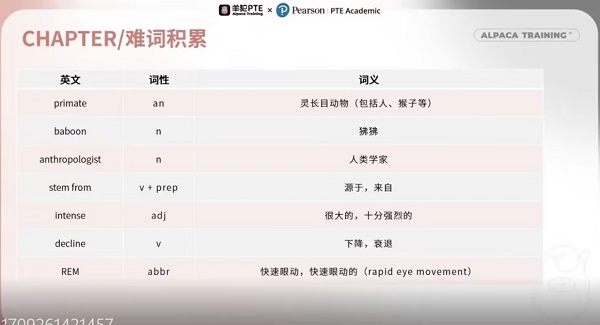
primate,包括了人和自然的灵长类动物;人类学家,anthropologist这个单词好像看上去是比较难的,但是在PTE当中包括SWT、阅读的题目,其实出现的概率还蛮高的。我们都知道一些题目好像会偏向于一些科技类和生物类的。anthropologists,包括人类学anthropology也是比较常出现的,大家一定要混个眼熟;intense,强大,非常强烈的、激烈的;REM,rapid eye movement,讲到跟睡眠相关的时候,这个REM其实经常会说,因为你做梦的时候,眼睛经常动,这就是REM。
第二部分:原文解析
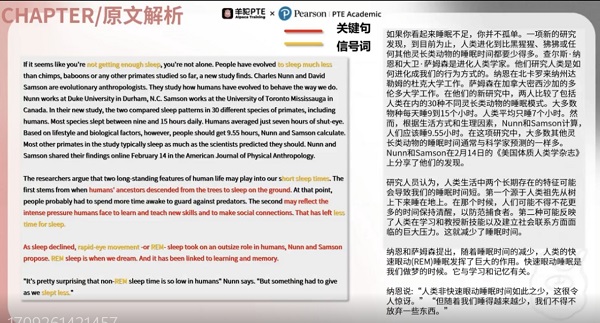
1、这道题比较长,但是其实理解起来并不难,还是比较简单的。It seems that what you're not getting enough sleep, you're not alone. 如果你睡的并不多,其实有很多人跟你一样是睡的不多的。We have evolved to sleep much less than change bones or other other private studies. 研究表明人比灵长类的动物睡的要更少一些。这两个人研究了人类是如何进化成我们现在这样。在他们的心理学当中,指出他们两个人competitively pattern in different species of primate,在三十多种不同物种的灵长目的动物当中,对比了睡眠的模式,包括人类。most species大部分的物种,每天要睡9到15个小时。人类基本上seven hours of I shot,人类大概就是7个小时。
2、根据生活的习惯还有物种的因素,人们每天应该睡到9.55个小时,但是人只有7个小时,大部分的灵长类都sleep much at the scientist project。就是科学家认为物种应该睡多少个小时,它们就真的睡了多少个小时。所以整个第一part就知道他讲的是一个研究,研究表明人类应该睡得比较长,但是结果人类睡的没有我们所想象中那么长,并且人类在灵长类动物当中睡的时间是非常非常短的。
3、研究者总结出了两个too long standing feature,2个最主要的为什么人类睡眠比较少的原因。第一个是人类的祖先从树上面跳下来之后在地上生活,他们可能要花更多的时间保持清醒的状态去防御那些捕食者;第二个可能是需要跟社会去沟通,导致睡得更少。所以这些可能都会导致人类的睡眠时间比较少。当人类睡眠时间比较少的时候,快速动眼时间就很outside role in humans。在人类当中它扮演着非常重要的角色,REM is when we sleep and listening to learn the memory. 我们做梦的时候就是REM了,它跟我们的学习和记忆相关。It's very surprise, none RES is is so lovely humans. 深度睡眠,不是快速动眼期的睡眠时间在人类当中是非常短的。But sometimes we have to give as we speak that,但是如果我们睡眠时间更少的话,我们总要放弃深度睡眠。
第三部分:答案组成
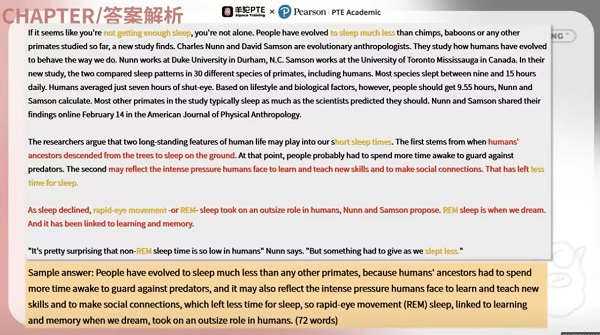
大家可以对着翻译来看一看这道题目本身。第一段讲的就是人类睡的比较少,第二段证明比较少是由两个原因构成。一种做题的方法就是把这两个原因摘取出比较重要的信息;另外一种办法是你可以就加第一句话,The research argue that too long standing features,把这两个视为细节,不放在总结当中,这也可以。第三和第四段,其实你只要带一个REM就可以了。所以第三段的某句话还是第四段某句话,或者是整合在一起,都是可以的。所以这道题的观点是比较突出的,每一段在干什么,很明显的告诉你。我们抓取重要的句子,相对来说还算是比较简单的一道题了。



